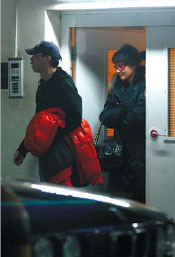 |
|
Film director Feng Xiaogang caught with a young woman. [Zhuo Wei]
|
Life as a paparazzo needs not just time and energy, but also some quick thinking.
Zhuo cites Sun Tzu's "The Art of War" (Sunzi Bingfa), a book about military strategy written around the 6th century BC, to explain: "Those good at battle know how to cover themselves."
To approach the homes of stars, he has sometimes posed as a house buyer, and at others as an interior decorator. But he has also played just a devoted fan. Every time he left a neighborhood, he would make a mental note of a company office located there, so that the next time he could pretend to be part of their staff.
Zhuo says his job takes courage, too.
Once the assistant of a very famous director called Zhuo, asked him to stop reporting on him, and threatened to "solve the problem in what we think is a proper way". Zhuo's partner once found himself running down a cliff for two hours, chased by staff of the film crew.
Other star managers have tried to co-opt Zhuo in creating favorable gossip. Zhuo accepted only one of these offers and included how the manager negotiated with him, in the story.
Chen Jiong, a former colleague, says "Zhuo is devoted to his job. He is alert to any clues that may be useful, even when chatting or dining with friends. Some entertainment reporters like to show off how close they are to the stars, but not Zhuo".
Reflecting on his work, Zhuo says: "Believe it or not, being a paparazzo is my way of realizing my dream to be a journalist.
"Journalism is about revealing the truth, but this goal would be harder to achieve if I were to cover politics or social news, which have more taboos. Entertainment is where it is practical for me to realize my dream."
He used to work as a secretary in a factory in Tianjin but his interest in writing and film led him to journalism in 2000. He soon became bored of the regular entertainment coverage. And when the first mainland tabloid, Big Star, hit the market in 2003, he became part of the first batch of professional paparazzi.
The truth about the entertainment world that he wants most to reveal is that stars are human beings, not role models.
"Many Chinese tend to equate stars with moral superiority," he says. "This is not the truth. I admit there are really upright stars but many of them lead a life that could hardly be defined as that of role models. My bottom line is I won't do anything illegal."
Zhuo attributes his distrust of role models to the reading of unofficial history books and celebrity biographies, the most recent being the one on Joseph Fouch, the French statesman, by Zweig.
"I do not look at unofficial history as mere fiction," he says. "I would rather believe that the things we are told to trust have another side. And biographies remind me that people have multiple sides."
He also likes detective novels. He has the entire collection of Agatha Christie and is a fan of Raymond Chandler's private detective tales.
His former colleague Chen says:
"He is one of those journalists who is always chasing something sensational or thrilling. Sometimes, they do uncover something really ground-breaking, but in other cases, they create thrilling news just for the sake of it."
Liang Shen, a senior entertainment reporter, sees money as a motivation, too.
Zhuo is chief reporter for the Southern Metropolis Weekly, which, according to Shen, brings him a monthly income of more than 10,000 yuan ($1,470).
Wei Zhou, chief editor of an entertainment website, says they buy the one-of-a-kind photos and scoops from Zhuo for around 5,000 yuan ($735). And the photos are usually sold to multiple media outlets.
Wei concedes, however, that Zhuo's job depends on luck. "After all, they cannot get big pictures every day," he says.
But Liang, the entertainment reporter believes Zhuo has "quite a considerable income".
It is 11 at night when my interview ends. Zhuo's partners, who have been driving around, come to pick him up.
"Let's make another round," he tells them.
(China Daily, March 25, 2009)